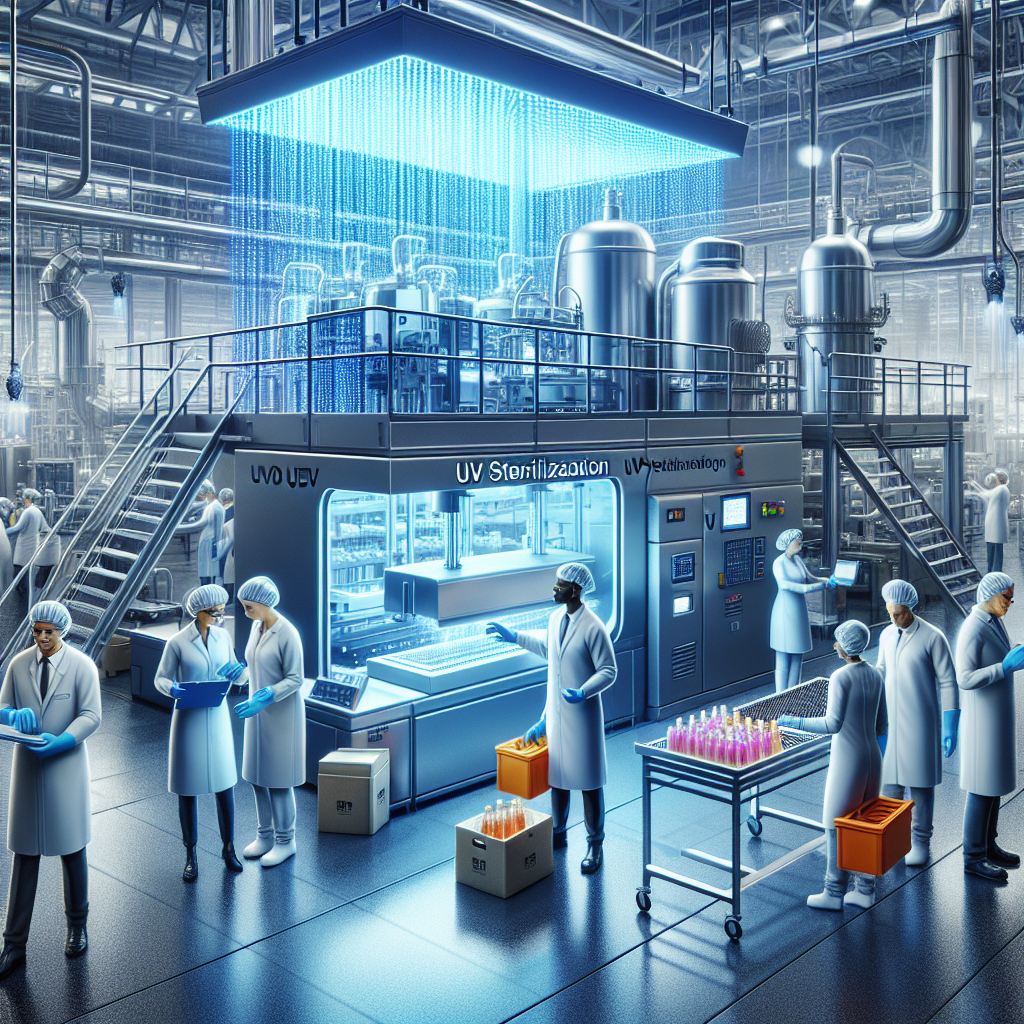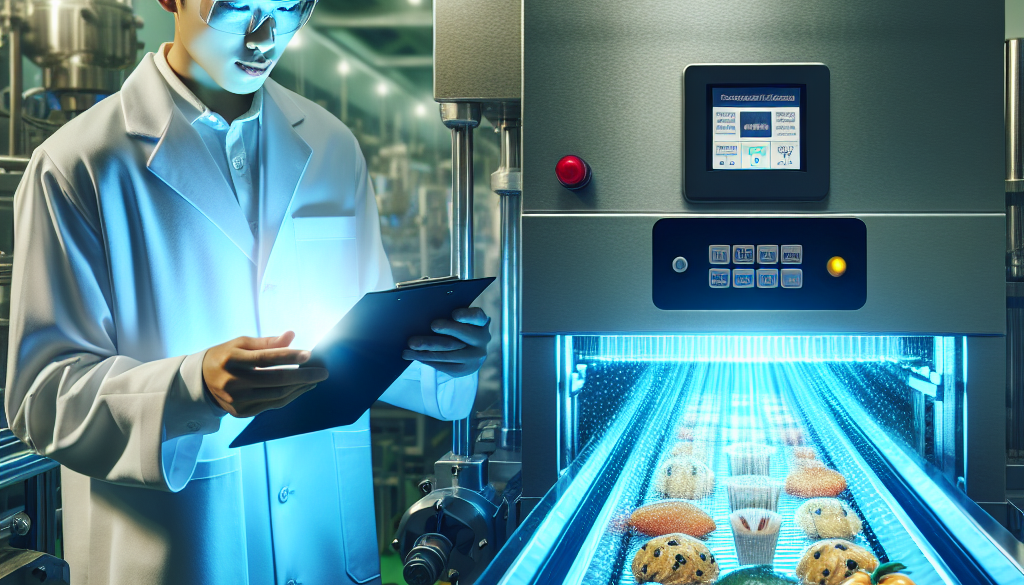Utilization of UV Sterilization in the Food and Beverage Industry
-
Table of Contents
- UV Sterilization: Revolutionizing Safety in the Food and Beverage Industry
- The Science Behind UV Sterilization
- Benefits of UV Sterilization in Food and Beverage Processing
- Applications of UV Sterilization in the Industry
- Challenges and Considerations
- Statistics Supporting UV Sterilization Efficacy
- The Future of UV Sterilization in Food Safety
- Conclusion: Embracing UV Sterilization for Enhanced Food Safety
- ETprotein: Your Partner for High-Quality Protein Products
UV Sterilization: Revolutionizing Safety in the Food and Beverage Industry

The food and beverage industry is a cornerstone of the global economy, with an ever-increasing demand for high-quality, safe, and shelf-stable products. To meet these demands, the industry continually adopts innovative technologies to enhance food safety and extend product shelf life. One such technology that has gained significant traction is ultraviolet (UV) sterilization. This article delves into the utilization of UV sterilization in the food and beverage industry, exploring its benefits, applications, and the future of food safety.
The Science Behind UV Sterilization
UV sterilization, also known as ultraviolet germicidal irradiation (UVGI), is a disinfection method that uses short-wavelength ultraviolet light to kill or inactivate microorganisms. The UV-C spectrum (100-280 nm) is the most effective in germicidal applications, as it disrupts the DNA and RNA of bacteria, viruses, and other pathogens, rendering them incapable of reproduction and causing infection.
Benefits of UV Sterilization in Food and Beverage Processing
The adoption of UV sterilization in the food and beverage industry offers numerous advantages:
- Chemical-Free Disinfection: UV sterilization eliminates the need for chemical disinfectants, reducing the risk of chemical residues in food products.
- Energy Efficiency: UV systems consume less energy compared to traditional heat-based sterilization methods, leading to cost savings and a lower carbon footprint.
- Non-Thermal Process: As a cold process, UV sterilization does not alter the taste, texture, or nutritional value of food, unlike thermal treatments.
- Fast and Effective: UV light can inactivate microorganisms quickly, allowing for high-throughput processing and ensuring rapid product turnaround.
- Extended Shelf Life: By reducing microbial load, UV sterilization can extend the shelf life of food and beverage products.
Applications of UV Sterilization in the Industry
UV sterilization is versatile and can be applied at various stages of food and beverage production:
- Surface Disinfection: UV light can be used to sterilize food contact surfaces, packaging materials, and equipment, reducing the risk of cross-contamination.
- Water Treatment: UV systems are employed to purify water used in food processing, ensuring it is free from harmful microorganisms.
- Air Purification: UV sterilization can improve air quality in processing facilities by inactivating airborne pathogens and reducing spoilage.
- Food Treatment: Certain foods, such as fruits, vegetables, and seafood, can be directly treated with UV light to reduce surface contamination.
- Liquid Products: UV sterilization is effective for clear beverages like water, juices, and soft drinks, ensuring microbial safety without affecting product quality.
Challenges and Considerations
While UV sterilization offers many benefits, there are challenges and considerations that must be addressed:
- Penetration Depth: UV light has limited penetration, making it less effective for opaque or dense products.
- UV Dose: Determining the appropriate UV dose is critical to ensure effective sterilization without damaging the product.
- Material Compatibility: Some packaging materials may be degraded by UV exposure, necessitating the selection of UV-resistant materials.
- Regulatory Compliance: UV sterilization systems must comply with food safety regulations and standards to ensure consumer safety.
Statistics Supporting UV Sterilization Efficacy
Research and market data underscore the effectiveness and growth of UV sterilization in the food and beverage industry:
- A study published in the Journal of Food Protection found that UV-C light reduced E. coli levels on the surface of fruits by up to 99.9%.
- The global UV disinfection equipment market size was valued at USD 2.9 billion in 2020 and is expected to grow at a compound annual growth rate (CAGR) of 14.5% from 2021 to 2028, according to a report by Grand View Research.
- According to the same report, the food and beverage segment is anticipated to witness the fastest growth over the forecast period due to the rising demand for non-thermal disinfection methods.
The Future of UV Sterilization in Food Safety
The future of UV sterilization in the food and beverage industry looks promising, with ongoing research and technological advancements aimed at enhancing its efficacy and expanding its applications. Innovations such as pulsed UV light and LED-based UV systems are being explored to overcome current limitations and provide more efficient, cost-effective solutions.
Conclusion: Embracing UV Sterilization for Enhanced Food Safety
In conclusion, UV sterilization represents a powerful tool in the food and beverage industry’s arsenal to ensure product safety and quality. Its chemical-free, energy-efficient, and non-thermal nature makes it an attractive option for producers looking to meet stringent safety standards while maintaining the integrity of their products. As research continues to validate its effectiveness and technology evolves, UV sterilization is poised to become an even more integral part of food safety protocols worldwide.
ETprotein: Your Partner for High-Quality Protein Products
In addition to adopting UV sterilization for food safety, it’s essential for food and beverage manufacturers to source high-quality ingredients. ETprotein is a company that stands out in providing premium protein products suitable for a variety of applications within the industry. Their extensive range of organic bulk vegan proteins and L-(+)-Ergothioneine (EGT) products are non-GMO, allergen-free, and boast high purity levels, making them an excellent choice for manufacturers committed to quality and safety.
About ETprotein:
ETprotein, a reputable protein and L-(+)-Ergothioneine (EGT) Chinese factory manufacturer and supplier, is renowned for producing, stocking, exporting, and delivering the highest quality organic bulk vegan proteins and L-(+)-Ergothioneine. They include Organic rice protein, clear rice protein, pea protein, clear pea protein, watermelon seed protein, pumpkin seed protein, sunflower seed protein, mung bean protein, peanut protein, and L-(+)-Ergothioneine EGT Pharmaceutical grade, L-(+)-Ergothioneine EGT food grade, L-(+)-Ergothioneine EGT cosmetic grade, L-(+)-Ergothioneine EGT reference grade and L-(+)-Ergothioneine EGT standard. Their offerings, characterized by a neutral taste, non-GMO, allergen-free attributes, with L-(+)-Ergothioneine purity over 98%, 99%, cater to a diverse range of industries. They serve nutraceutical, pharmaceutical, cosmeceutical, veterinary, as well as food and beverage finished product distributors, traders, and manufacturers across Europe, USA, Canada, Australia, Thailand, Japan, Korea, Brazil, and Chile, among others.
ETprotein specialization includes exporting and delivering tailor-made protein powder and finished nutritional supplements. Their extensive product range covers sectors like Food and Beverage, Sports Nutrition, Weight Management, Dietary Supplements, Health and Wellness Products, and Infant Formula, ensuring comprehensive solutions to meet all your protein needs.
As a trusted company by leading global food and beverage brands and Fortune 500 companies, ETprotein reinforces China’s reputation in the global arena. For more information or to sample their products, please contact them and email sales(at)ETprotein.com today.












